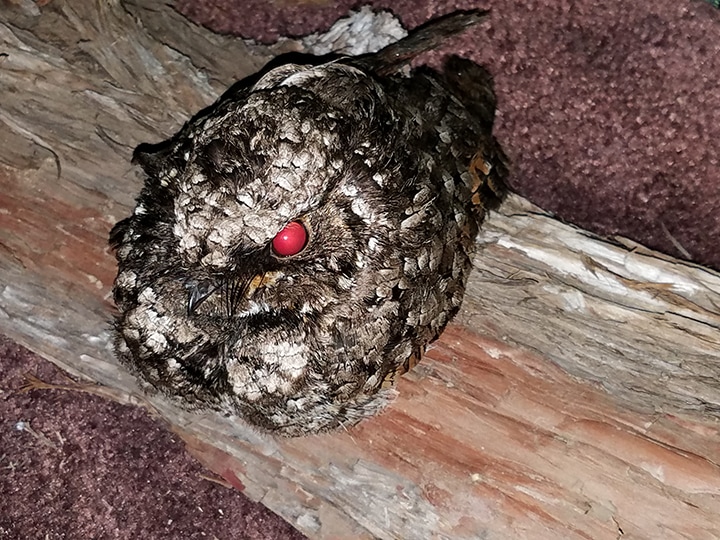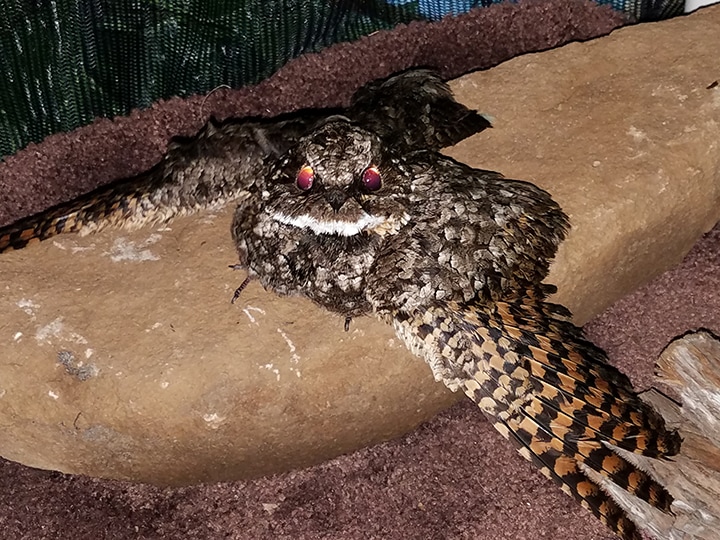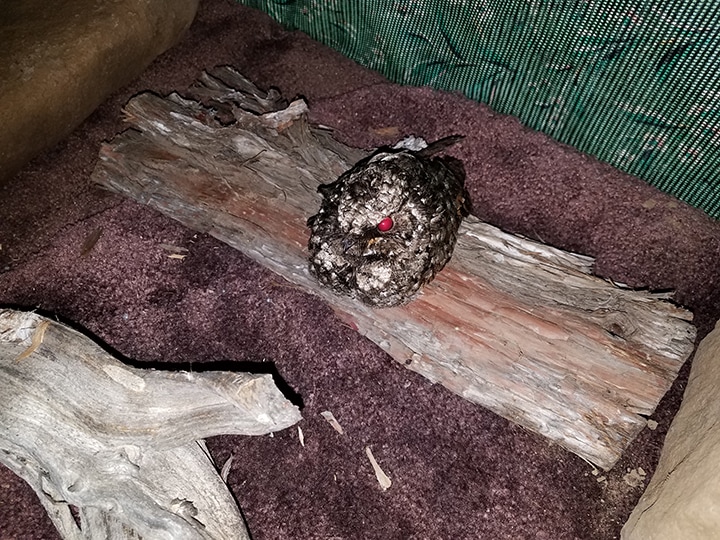|
Thank goodness for folks who see birds and go, 'That doesn't seem right'! This little cutie pie was found in the Lowe's garden center in Bend. An employee luckily thought that it looked out of place, although there are some birds that make the center their home. But this one looked out of place, so she picked it up and eventually it found its way to me through another person willing to drive her to me. Luckily too, those involved in the rescue all were wise enough not to simply put the bird outside, where she would for sure have died from hypothermia. She had somehow gotten some kind of sticky spray on her feathers that would have made it nearly impossible for her to stay warm, much less fly. However, this was not immediately apparent and one could easily have mistaken this bird as healthy. (Which is why it is better safe than sorry to call a professional and find out the best thing to do for a bird).  A Poorwill's feathers are so soft, delicate, and fragile that they are easily harmed in captivity. To feed her we must use a soft, smooth (we use silk) fabric to hold her. To protect her fragile mouth parts, we must use a specific method for opening her mouth, her tiny bill and the bones around her mouth can easily be broken. She take specialized care. This bird is a Common Poorwill, and they are in the "nightjar" family, like the Common Nighthawk. Although these birds have the dappled, brown plumage of an owl or certain raptors, and one is has 'hawk' in its name, they have no relationship at all to raptors or owls. Instead, these sensitive little birds eat only insects, and only flying ones at that. Their unique plumage makes them as silent as the quietest owl (the barn owl) and offers them their only form of defense - extreme camouflage. In fact, they hide so well that researchers have found it incredibly difficult to find and study these birds. However, they are quite vulnerable as their camouflaged plumage is designed to match the ground around them, where they rest and breed. Being dependent on the ground puts them in harms way with outdoor cats, loose dogs, and all sorts of predators. These are birds that eat entirely in the air ('on the wing'), usually low to the ground, and mainly moths and beetles. Their mouths are huge, and extend the entire width of their head. They have tiny bills that are not adapted to eating insects off the ground, instead they fly toward a bug and scoop it into their big, open mouth (kind of like a humpback whale scoops up fish). They eat mainly at dusk and dawn (called 'crepuscular'). One of the most fascinating aspects about the Poorwill is that they go into a state of near hibernation, called 'torpor.' The Hopi called this bird, the "sleeping one" because they would find them asleep on the ground in a hibernating state. In times of cold, like a Central Oregon spring or even summer night, below 50 degrees, these birds save on energy by going into torpor (which they can do at will anytime the temperature drops or they have low food options). There are still many unanswered questions about this secretive, elusive bird. So our little Poorwill is getting the nutrition she needs and we are determining the best way to get the sticky goo off her feathers. Every kind of product or contaminant needs a certain way to get it off. It is not always the case that a simply bath with a well-known soap will do the trick. In fact, in this bird's case, the usual soap bath did nearly nothing. So now we must experiment (with various loose contaminated feathers) to find the right product to remove it. We do not NOT by repeatedly bathing the bird, but instead use some of the feathers she lost that have it on them. Bathing such a bird is precarious, risky, and can hurt the bird. In fact, its quite a challenge to bath small, fragile birds. Thanks to the great folks at the International Bird Rescue, one of the world's main oil spill response organizations, we can get ideas and suggestions that will save us time and stress for our bird. Thanks Michelle! So, for now, Poorwill gal shall stay warm, get fed by hand every day a few times, and we shall find a way to clean her up. Then she will get bathed, have some flight time in a large aviary with flying insects we have provided for her, and then get released to go find a mate and have more baby Poorwills!
Insect-dependent birds like our little Poorwill are expensive to feed, it takes many insects and a variety for her to have nutritional balance while in care. If you would like to contribute to this cute and precious bird, please consider making a donation. These birds are increasingly rare and are in decline, she is important. Comments are closed.
|
AboutNative Bird Care's is celebrating its 10th anniversary! Our main focus is song, shore, and waterbirds. We offer specialized care and facilities for these extraordinary birds.. Archives
July 2024
Categories
|


 RSS Feed
RSS Feed